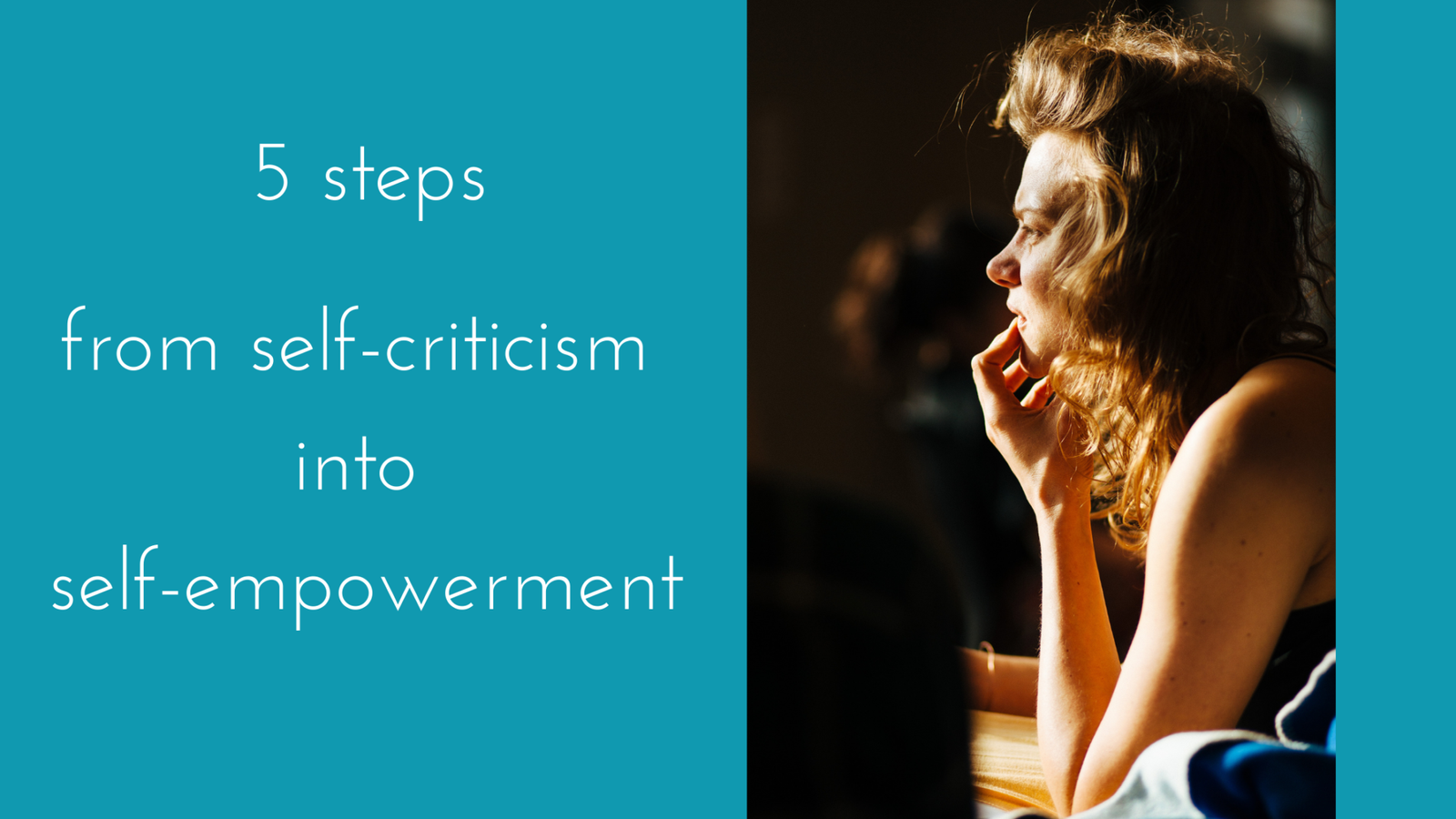
5 Steps From Self-Criticism To Self-Empowerment
Don’t let your inner voice rob you of your inner strength
Your private inner dialogue and the way you think and analyze yourself can be a great asset to reaching your goals and living the life you wish. The way you think influences how you feel and how you behave. While self-analysis is a healthy way to observe your behavior and learn to overcome weaknesses and bad habits, it often transforms into self-devaluation. Instead of empowering you for the better, self-criticism usually takes us down into a vicious spiral of self-blame that quickly robs us of our inner strength. We would be better off not listening to this kind of inner voice. Or better yet, learning how to transform our self-criticism into self-empowerment.
Do you have a harsh inner critic? Know that you are not alone
“If I could just stop my inner voice, that tells me over and over again that I will never manage, I will never be enough, I will always only be ordinary…!” my client exclaimed at the end of a fantastic session. He had made such progress, but still, it wasn’t enough. It became evident that his harsh judgment and inability to control his inner critic would be one of his biggest obstacles to reaching his desired goals in life.
And he is not the only one. Most of us are familiar with an inner voice that quickly turns into a harsh reprimand and stops our progress in its tracks. This self-judgment is often mean, untrue, and in addition, it is an ineffective tool for our self-development. Instead of strengthening our confidence in ourselves, we wish to curl up into a ball and never lift our heads again. The good news is that we can transform our self-criticism into self-empowerment.
From among the many exercises that we use in a Pantarei process to help our clients change the way they think, here are five of our favorites, that can tame our inner critic:
1. Learn to identify when your inner critic is at work
Our self-critic often works on autopilot. When this happens, we need to wake up and realize the damage we are doing to ourselves. Try to notice when your self-judgment pops into your awareness. Notice when you are talking to yourself in a familiar way, repeating assumptions about yourself that limit your options. Your mood stays stuck, and it seems like you’re in an endless loop. Some examples include when you:
· speak about yourself in terms of: “I’m always doing…, I will always be…, I will always…”. This will never leave any room for improvement or change and indicates your inner critic at work.
· analyze your mistakes or problems by identifying them with who you are. “I’m lazy…” rather than: “…in this situation, I should have acted more quickly”. “I’m mediocre…” rather than: “…in this situation, I could have worked a little harder and excelled”. Using the phrase “I’m …” is another giveaway that your self-critics is getting the better of you.
· are mean to yourself.
· blame yourself.
· and when you fail to acknowledge any of your achievements.
Start paying attention to when your inner critic is at work. And recognize your ‘favorite’ narratives.
Now you have the base on which to transform your self-criticism into self-empowerment.
2. Change the way you talk to yourself
When you recognize that you are being self-critical, take a moment to examine how you talk to yourself. Stop this habit in its tracks. And instead, ask yourself:
· What do I mean by that?
· Are my thoughts true? Do a reality check, weighing up all the evidence.
· Replace your negative statements with something more realistic. If your inner voice says: “I will never learn to speak up,” think about situations in your life where you did speak up, and what enabled you to do so. Then rephrase your statement into something that you can act upon. For example, ” If I have enough time to prepare, and feel that I am in a safe environment, I am able to speak up”. So, the question then becomes: how do you best prepare and create the right environment for yourself?
· When you find yourself saying things like: “I’m a loser, I’m never going to manage and always end up in the same dilemma…” a constructive replacement could be, “here is room for improvement. This is what I have achieved so far and here is what I need to learn more about…”
You don’t need to develop unrealistic statements, but achieving a balanced, realistic outlook is the key to becoming mentally stronger. Seek out the logic in your statements and, by that, transform your self-criticism into self-empowerment.
3. Express your inner voice out loud to reality-check with someone you trust
It might be challenging to understand that your thoughts about yourself aren’t particularly accurate. So, why not let someone else examine your ideas and the way you think about yourself? Choose a person you trust and dare to speak out loud what you secretly say about yourself. Listen to what they tell you, and what they see in what you have to say. Together, consider how accurate your self-assessment is.
Most of the time, the result will be rather surprising. At least, that is what we can see from our clients and from the first sessions our own students experience in class with us. At first, many of our students are convinced that they did a terrible job in the first sessions they give each other. In an attempt to evaluate their work, they fall into the loop of self-criticism. When this inevitably happens, we recommend taking time for a reality check with their fellow classmates, who acted as their clients. By asking their classmates how they experienced the sessions and if the sessions created a change in how they felt, they can get accurate feedback to adapt their own inner voice.
Our inner critic hardly stands a chance when we discuss our doubts or concerns with a good friend, partner, or person we trust means well. Listening to others and the way they see us can bring back compassion toward ourselves and is a sure support when we wish to transform our self-criticism into self-empowerment.
4. Change the channel and tune in to how you feel
Just as your thoughts affect how you feel and behave in the world, how you feel affects how your think and act. And your behavior affects how you feel and think. As humans, all of our abilities and qualities are interlinked and work together in one holistic system.
Once we are very engaged in judging and self-devaluation, this will be the prominent space-taker in our experience. Everything else will fall into the background. Even while it is often an unpleasant sensation and leaves us feeling miserable, self-criticism is familiar and makes us feel we have some sort of control. But it blinds us to the actual causes of the problems or emotions that we experience. It prevents us from really connecting to how we feel, what the reality of our situation is, and what we need, in order to improve our situation.
So, try changing the channels. Instead of only following up on the way you think and rephrase it, try to tap into how you feel. Ask yourself: “How am I feeling today? Did something happen that was intense and touched me emotionally?”. Give space to what lingers in the background. Become curious to further explore these questions. Once you start to recognize more and more how you feel, invest in exploring those emotions. When you add your feelings and shift your attention in that direction, your inner voice will move into the background, in order to give your feelings center stage. This, in turn, gives you more direct access to your gut feeling, your intuition, the more accurate inner voice to follow.
5. Start by getting up, to stop life from getting you down
When we keep replaying a mistake we made over and over again, we drag ourselves down. Even our posture and breathing will participate in this activity, as our physical body is affected by our thoughts. When our head swirls with thoughts, the rest of our being starts functioning on autopilot. It is hard to concentrate on anything else or even to notice our surroundings.
Getting physically active forces us to change that and shifts our focus away from our inner critic. So, put on your favorite music and dance; go for a walk; run, stretch, and get active. Within minutes there will be a shift allowing your inner critic to transform into self-empowerment.
Try out the following exercise and see if this works for you:
- Stand up and take a few deeper breaths. This will let you experience more of your body and will start shifting the focus away from your thoughts.
- Close your eyes.
- Massage your head, your skull, and your face. This will allow your head to get a physical experience and will disrupt your repetitive thought process.
- Tap your chest and arms with your fingers while humming. This will allow you to hear a different sound than the voice in your head. In addition, it adds even more of your physical body into your experience.
- Stand on one leg and move the other in the air, exploring all directions. This will make sure you shift fully with your focus also to the lower part of your body and away from your head.
- Repeat the above with the other leg. Your inner critic will already have lost its balance by now and will be moved to the background, if not yet silenced entirely.
- Stretch your whole body in a way that feels good to you. This will allow your new experience, your shift of focus and attention to manifest itself. Experience yourself as being much more than what you hear from the critic in your head.
Follow this link to our Instagram page with content about this topic and much much more.
I am very interested to hear if these tips are helpful for you and if you have any additional ones to add. Please let me know in the comments below.
Often, what stands in our way is not the circumstances we are in, the other people involved, or a lack of opportunity. Transforming our self-criticism into self-empowerment ensures we can reach our goals and wishes getting stuck with our own inner critic.







